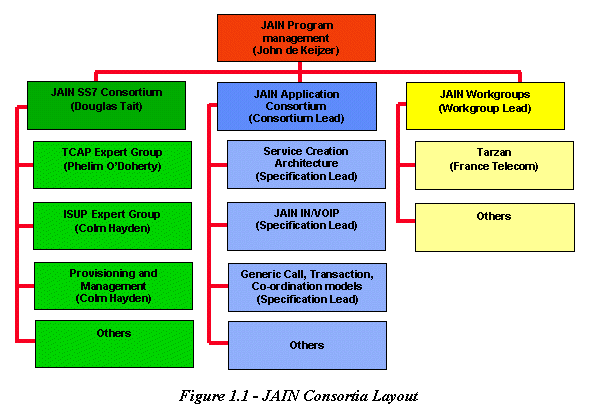| 1 Objectives and Scope |
  |
Java API's for the Integrated Network
(JAIN) Framework brings Service Portability and Network Convergence into
the Telephony Network. JAIN encompasses a standard set of interfaces for
service creation and a number of standard interfaces for service execution.
The service creation interfaces allow new services to be described as JavaBeans
, which can be connected using standard graphics tools to create new services.
The service execution environment includes JAVA interfaces to a number
of telephony protocols, such as ISUP and TCAP. How the development of JAIN
TCAP fits into overall JAIN program management is specified in Figure
1.1:

The reason why we need JAIN is due to the technological
blockage with interfaces to switches, computers, and services. The problem,
which is deep inside the network, is that services cannot be transported
from one system to another. The JAIN specification defines an interface
into the specific domain of each vendor's SS7 stack, as well as providing
an interface for an application to any vendors stack.
The need to define a standard API specification has become
paramount as users of the telephone and Internet demand better, coherent
services. Java provides a perfect environment for developing such a standard.
The Java write once, run anywhere philosophy commands interoperability
between JAIN SS7 stack providers enabling Network Equipment Providers to
choose between JAIN SS7 vendors and provide services compatible with any
system.
A Java approach to telephony offers telephone service
providers interoperability between network elements. Resulting from this,
Network Equipment Providers and SS7 Vendors will be able to bring their
true value to the market unobstructed by compatibility and interoperability
issues.
The scope of JAIN TCAP is to define an Java Application
Programming Interface (API) for the TCAP layer of a Signaling System 7
(SS7) stack. The JAIN TCAP design concept provides a high level common
interface, which supplies the functionality of all the supported variants.
A specific implementation of the API can then be mapped to a specific protocol
variant.
This document is laid out in the following format:
-
Chapter 1 – Objectives
and Scope: This chapter provides an insight to JAIN, why we need JAIN,
and what needs to be achieved in order to provide JAIN TCAP.
-
Chapter 2 – Introduction:
This chapter provides an introduction to the Transaction Capabilities Application
Part, how it operates, and how its operation can be mapped logically to
the real world.
-
Chapter 3 – Requirements
Definition: This chapter defines the requirements necessary to develop
JAIN TCAP v1.0. Each requirement’s function is explained in the subsequent
paragraph and any additional information needed is provided at this point.
-
Chapter 4 – External Requirements:
This chapter outlines the requirements that don’t directly effect the API’s
implementation, however they may effect the API’s development process.
-
Chapter 5 – Appendix I: This
chapter lists the material, which was referenced throughout this document.
-
Chapter 6 – Appendix II: This
chapter lists the abbreviations used throughout the document as well as
any terms, which may need explanation.
-
Chapter 7 – Appendix III: This
chapter lists the figures and tables supplied throughout this document.
-
Chapter 8 – Appendix IV: This
chapter provides a high level logical example of transaction processing,
with relevance to an ATM.
-
Chapter 9 – Appendix V: This
chapter provides a brief summary of the partner companies involved in developing
JAIN TCAP v1.0.
-
Chapter 10 – Appendix VI: This
chapter outlines the control, distribution and history of this document.
1.1 JAIN TCAP API Specification
The JAIN TCAP API specification provides a standard portable
interface for the transfer of information between Telephony Network Nodes.
The purpose of this document is to define the requirements for the JAIN
TCAP API specification. This document contains a concise list of all the
requirements, which need to be satisfied for the public release of he JAIN
TCAP API specification. It is important to note the syntax of the requirements,
in that:
-
If the wording of a specific requirement includes ‘shall’
then the incorporation of this requirement in the JAIN TCAP API specification
is mandatory.
-
If the wording of a specific requirement includes ‘should’
then the incorporation of this requirement in the JAIN TCAP API specification
is strongly recommended, but is not mandatory.
The deliverables of the JAIN TCAP API specification will
encompass:
-
A Java API specification, which will define a common interface
for accessing the functionality of proprietary implementations of the TCAP
layer of any SS7 protocol stack.
The Technology Compatibility Kit (TCK) and the Reference
Implementation (RI) do not have to be delivered until the public release
of JAIN TCAP API specification.
-
The TCK tests the implementation of JAIN interfaces for compliance
to the JAIN Specification. The purpose of the JAIN TCK is to verify that
a Java TCAP protocol implementation is compatible to the JAIN TCAP API
Specification.
-
The RI is the "proof of concept" implementation of the Specification.
The RI will emulate or simulate the functions of a SS7 stack in order to
verify the requirements in this specification. The intention of the RI
is not to implement an SS7 stack or to replace vendor SS7 stacks. The purpose
of the RI is to provide a means to verify Java applications are compatible
with the JAIN specification.
The Participant whose Expert is chosen as Specification Lead
is typically responsible for obtaining the appropriate rights the TCK and
the RI to fulfill the Java Specification Participant Agreement.
The JAIN TCAP API specification will follow the Java language
naming convention and strictly follow the functionality of the TCAP specifications
used. The Java specification definition and process can be found at:
http://developer.java.sun.com/developer/jcp/index.html
Copyright - 2000 Sun Microsystems
28 June 00
If you have any comments or queries, please
mail them to [email protected]